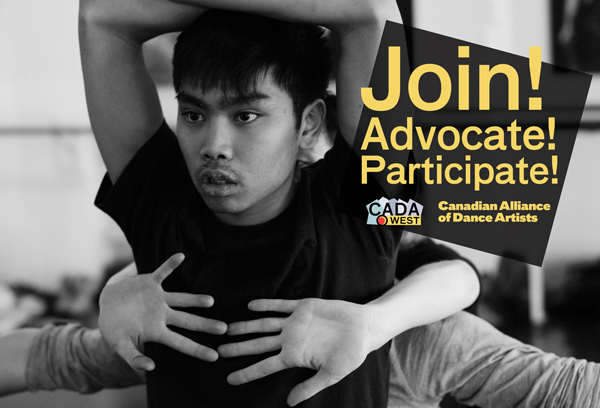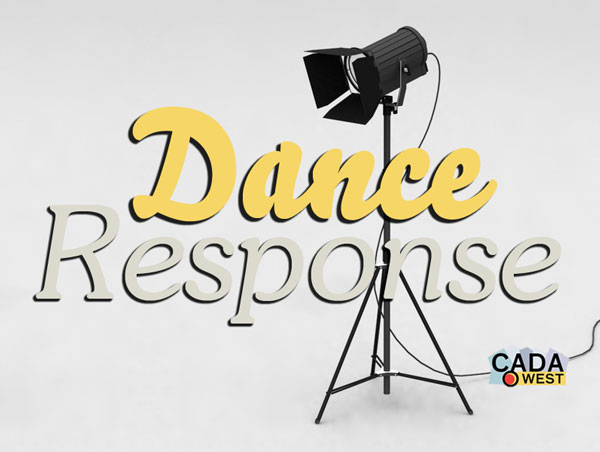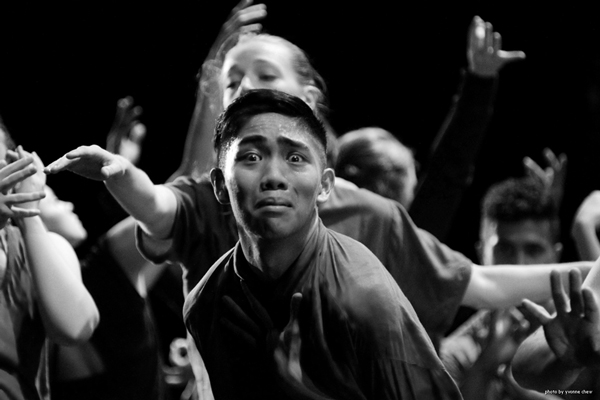Get to know your CADA/West
February 2015 Member's Newsletter
This edition features a profile of dance artist, Kokoro Dance co-director & VIDF co-producer Jay Hirabayashi, our Annual Conference, our next Danse Response show; and performance discounts.

Jay Hirabayashi
How long have you been dancing? What got you into it?
I started dancing at the Paula Ross Studio that used to be at Waterloo and W. Broadway in the fall of 1977. That was in the days before arthroscopic surgery and I had spent 5 days in a hospital having the meniscus in my left knee scraped out. I had torn it in 1969 racing in the Canadian National downhill ski championship races in Whistler. I wanted to get my leg back in shape so decided to take a dance class. After 6 months of classes, Paula gave me a scholarship. After 9 months, she invited me to join her company.
Why did you decide to start a dance company?
Barbara Bourget, my life partner, and I had worked as co-founding artistic directors of EDAM from 1982 to 1986. EDAM was a collective at that time with ourselves, Peter Bingham, Jennifer Mascall, Lola MacLaughlan, Peter Ryan, and briefly, Ahmed Hassan, as co-directors. We were all strong personalities with strong opinions and weren't very good at compromising which is what you have to do if you want to work collectively unless you are somehow miraculously all on the same page. EDAM created some great work in that period, but it was a struggle to get consensus. We were raising three kids and when the fourth was about to arrive in 1986, we decided it was a good time to form our own company. We were interested in investigating butoh which we didn't think would be possible within the collective structure of EDAM. So we formed Kokoro Dance with no funding and with a newborn son.
Why did you become a presenter and start the VIDF?
After starting Kokoro Dance, we found ourselves repeating a pattern of creating two to three new works a year that never had a life outside of Vancouver. Vancouver was (is) far away from Toronto and Montreal and it was difficult to get presenters to come to see our work. We realized that we were not alone in this predicament. The Dancing on the Edge Festival provided some exposure, but its programming formula of shared short works and its off-season dates made it a good festival to do choreographic research, but a poor one for showcasing full evening works. Dance audiences were also declining in size and were not growing outside of what was largely friends and families of the respective dance artists/companies. In fact, we saw the same people at every dance performance except for ours as we had developed a more diverse audience through our many site-specific performances. There was also a declining number of companies touring to Vancouver. We had noted the success of F.I.N.D. (Festival of International New Dance) in Montreal in galvanizing the Montreal dance community and bringing international presenters to that festival. We thought, why not start an international dance festival here? We suggested to The Dance Centre that it would be a good community project, but its primary interest was building what eventually would be the Scotiabank Dance Centre. Since no one else wanted to do it, we just went ahead and initiated the festival. I guess we have the attitude that "if it is to be, it is up to me".
Now, in your 16th season, is there a curatorial vision for the Festival? Has it changed over time? What kind of work do you want to feature?
We seek a balance in programming local, national, and international artists. We are drawn to artists that recognize the body as the primary instrument of communication. We like work where the dancers sweat. We like diversity in our programming. I don't think our curatorial vision has changed much since the beginning.
Give us a glimpse into the daily life of a presenter of an international festival?
to be continued... I have to go teach...

more from Jay Hirabayashi...
I administrate two separate societies, Kokoro Dance Theatre Society and the Vancouver International Dance Festival Society. My primary challenge is to raise over a million dollars a year in cash and in-kind revenues to cover the expenses of the VIDF and Kokoro Dance, so I am continually writing grant applications and final reports. This year, we have to raise an additional half-million dollars to cover the renovation costs of our new Woodward's studios. I work ten to twelve hours a day usually seven days of the week. I teach on Tuesday and Thursday mornings from 9:30am to 11:30am at Harbour Dance. When we are in creation periods, I spend more time in the studio, and get behind in the administration tasks. I also maintain our two websites, see as many performances as I can, travel to other festivals, study with other butoh teachers, babysit our five grandchildren, and try to work out when I can. I PVR Canucks games and watch them when I should be sleeping.
Any advice for emerging choreographers? What are the biggest challenges you see them facing? Are they the same as you faced?
I think the best advice I can give to emerging choreographers is to make sure that they understand that good choreography is usually built on a foundation of dancing for good choreographers for a long period of time. Secondly, choreographers have to have some life experience if they are to create something that can be understood as art. Unfortunately, I don't think you get life experience in a dance studio or from reading books.
I don't think the challenges of surviving as a dance artist are any less easy now compared to when I started my professional career. Technology is undermining live performance appreciation, however, and the younger generations coming up have less exposure to real people doing real things. So maybe that is a different kind of challenge compared to the late seventies when phones still had to be plugged into the wall.
CADA/West Member Joshua Ongcol by Yvonne Chew

CADA/West's Annual Member Conference 2015: What's the plan?
March 28th, 12-4pm @ Roundhouse Community Centre Exhibition Hall, Vancouver
Have you ever wondered how you'll get from idea to goal? Do you know where you want an idea to go but aren't sure how to get it there? Join us March 28th, 12-4pm at the Roundhouse exhibition hall for our annual conference and learn how to build a plan, by building an actual plan!
We've discussed goals and directions for CADA/West a lot in the last two years and you've come up with some amazing ideas. Case in point, the Studio Subsidy Pilot Program that we're about to unveil. Studio rent is an economic barrier for a lot of dance artists and CADA has responded to your feedback with a new pilot program for the 15/16 year that will hopefully address these issues. This is an excellent example of how we're a member-driven organization.
All of our programs and services in the next five years will be coming straight from you. We want you to come to the conference, build concrete plans and then decide as a group whether or not those plans should be acted upon and whether they should be short-term or long-term goals.
e also have a ton of other news, like the changes to the membership application and TSP program that affect all of you. Everything is going ONLINE this year and there's details that you need to know. Be in the loop!
PLUS: if you register before March 11th, we'll give you a free VIDF membership so that you can access the free dance performances happening at the Roundhouse between March 12 - 28. Light refreshments will be served.
AGENDA
- 12pm - Greeting, Important Announcements & Advocacy Actions
- 1pm - Review of Strategic Plan & Suggested Actions submitted by members
- 1:30pm - Elements of an Action Plan
- 2pm - Break out groups: Action Plans drafted
- 3pm - Presentation of Action Plan ideas & voting
- 3:45pm - Closing Remarks
If you have any questions about the conference, please don't hesitate to get in touch with us at office@cadawest.org.
To our Members outside of Vancouver, are you interested in a Live Feed? Let me know and I will set it up for you.

Dance Response at Chutzpah!
Shay Kuebler's GLORY, February 22nd, 2pm @ Norman Rothstein Theatre
For our last Dance Response show of the season, we'll be seeing GLORY. If you're interested in finding out what Dance Response is all about, please email us. CADA/West Members pay only $7 a ticket and we chat after the show.
CADA/West Member Ralph Escamillan by Yvonne Chew

Performance Discounts
CADA/West Members receive ticket discounts, through our Professional Discounts program, at several theatres throughout Vancouver, Victoria and Edmonton. These discounts vary by theatre... ask at box offices if they offer a “cada discount” and be sure to have your membership card with you in order to obtain the discount.
At this year's Chutzpah! Festival, CADA/West members get to enjoy the seniors rate on tickets. Use the code CADA when buying tickets online, by phone or in person at the Chutzpah! box office.
See the full list of Business Members and Supporters who offer Professional Discounts to CADA/West members.
CADA/West and its Members,
ensuring dance remains vital to our culture.
designed and built by Deanna Peters, CADA/West Communications Designer
